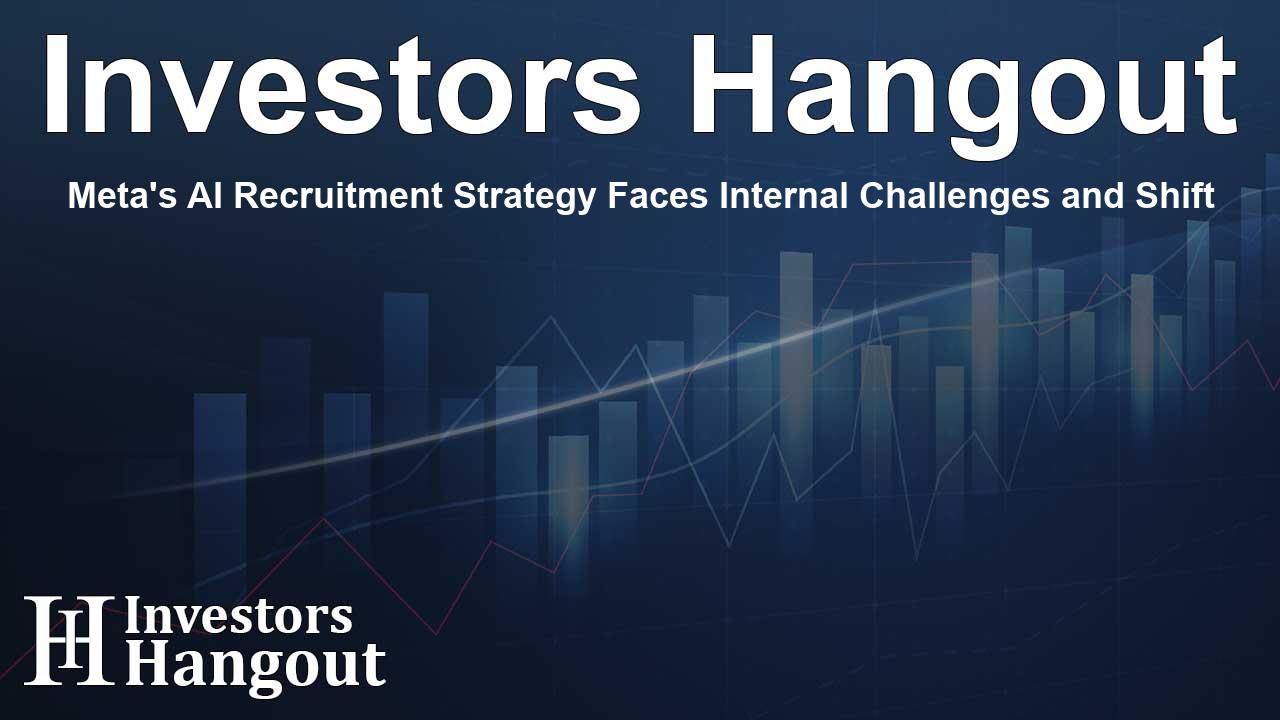Meta's AI Recruitment Strategy Faces Internal Challenges and Shift

Meta's Recruitment Drive and Its Impact
Meta Platforms Inc. faces increasing challenges as CEO Mark Zuckerberg aggressively pursues top talent in artificial intelligence (AI). This move has led to significant internal unrest, including the departure of high-level employees and disputes over compensation.
Elevated Status and Internal Divisions
The company's secretive TBD Lab, located conveniently near Zuckerberg's Menlo Park office, is designed to house some of the most talented AI researchers at Meta. However, the manner in which this unit operates has led to noticeable societal divisions within the organization. Members of TBD Lab remain off the official internal charts while their colleagues are listed publicly. This has unintentionally fostered feelings of inequality and superiority amongst employees in a company with a valuation exceeding $2 trillion.
High-Profile Executive Changes
Despite extensive recruitment efforts, Meta has contended with notable departures, with at least 21 senior researchers coming from OpenAI and other tech giants like Alphabet Inc. and Apple Inc. The pressure to attract and retain elite talent has led to increasing tension within the company. Several well-known figures, such as AI researcher Rishabh Agarwal, have recently exited Meta due to work culture differences, including an insistence on in-person requirements.
The Million-Dollar Talent Exodus
In an illustrative incident, ChatGPT co-creator Shengjia Zhao left Meta shortly after accepting a position with the company. As a response to his resignation, Meta was compelled to increase his salary significantly and provide him with a chief scientist title to retain him. Others, like former OpenAI researchers Avi Verma and Ethan Knight, have also returned to their former positions after experiencing dissatisfaction at Meta.
Shift to Hiring Restrictions
These developments have prompted the organization to implement immediate hiring freezes, now requiring approval from Chief AI Officer Alexandr Wang for any exceptions. These changes come on the heels of Zuckerberg's hefty investment in Scale AI to bolster Meta's AI capabilities further.
Key Employee Raises and Internal Discontent
Among the ongoing tensions, existing employees have become increasingly vocal in advocating for raises. As higher salaries are offered to newcomers, many long-term staff have been leveraging competing job offers to negotiate substantial salary increases. This heightened sense of urgency for elevation in pay echoes sentiments expressed by industry veterans like Laszlo Bock, a former Google operations head, who emphasized the importance of fostering an inclusive culture without alienating existing talent.
Meta's Continued Competitive Pressure and Approach
The recruitment frenzy intensified after the mixed reception of Meta's Llama 4 model, which did not perform as anticipated compared to competing AI technologies like those offered by DeepSeek. Reacting to these criticisms, Zuckerberg has reorganized the AI division multiple times in a short span, ultimately leading to the formation of four specialized units, including TBD Lab.
Expanding AI Capital Expenditures
Looking ahead, Meta's capital expenditure on AI is projected to soar to $72 billion by the year 2025, a significant increase from previous spending. As demand for advanced AI technology grows, the competition among industry leaders intensifies, with a combined global expenditure on AI infrastructure expected to exceed $250 billion by the end of the decade. The industry anticipates about 2,000 researchers worldwide capable of creating foundational AI models that drive innovation.
Frequently Asked Questions
What is the underlying issue in Meta's AI recruiting efforts?
Meta's aggressive pursuit of AI talent has led to internal conflicts, including employee dissatisfaction and high-profile resignations.
How has TBD Lab altered the dynamics within Meta?
TBD Lab's secretive nature has fostered divisions among employees, creating status disparities and feelings of inequality.
What prompted the hiring freeze at Meta?
Increasing employee turnover and discontent over compensation led Meta to implement a hiring freeze requiring special approval for new hires.
How are existing employees responding to new hires' compensation?
Current employees are advocating for higher salaries amidst reports of million-dollar packages offered to new recruits, stirring discontent.
What is the anticipated future direction for Meta in AI?
With projected capital expenditures increasing considerably, Meta is focusing on enhancing its AI capabilities while navigating internal challenges.
About The Author
Contact Henry Turner privately here. Or send an email with ATTN: Henry Turner as the subject to contact@investorshangout.com.
About Investors Hangout
Investors Hangout is a leading online stock forum for financial discussion and learning, offering a wide range of free tools and resources. It draws in traders of all levels, who exchange market knowledge, investigate trading tactics, and keep an eye on industry developments in real time. Featuring financial articles, stock message boards, quotes, charts, company profiles, and live news updates. Through cooperative learning and a wealth of informational resources, it helps users from novices creating their first portfolios to experts honing their techniques. Join Investors Hangout today: https://investorshangout.com/
The content of this article is based on factual, publicly available information and does not represent legal, financial, or investment advice. Investors Hangout does not offer financial advice, and the author is not a licensed financial advisor. Consult a qualified advisor before making any financial or investment decisions based on this article. This article should not be considered advice to purchase, sell, or hold any securities or other investments. If any of the material provided here is inaccurate, please contact us for corrections.
